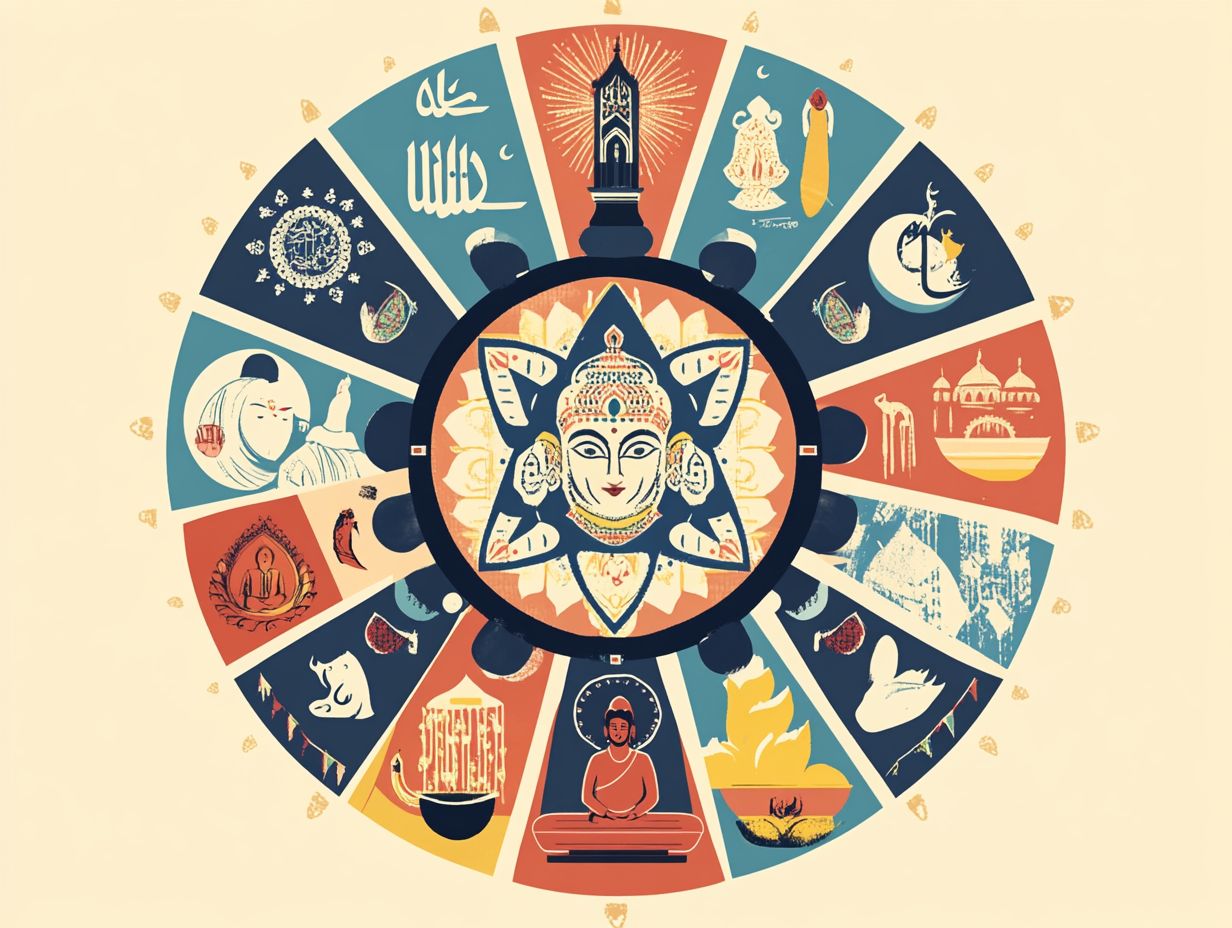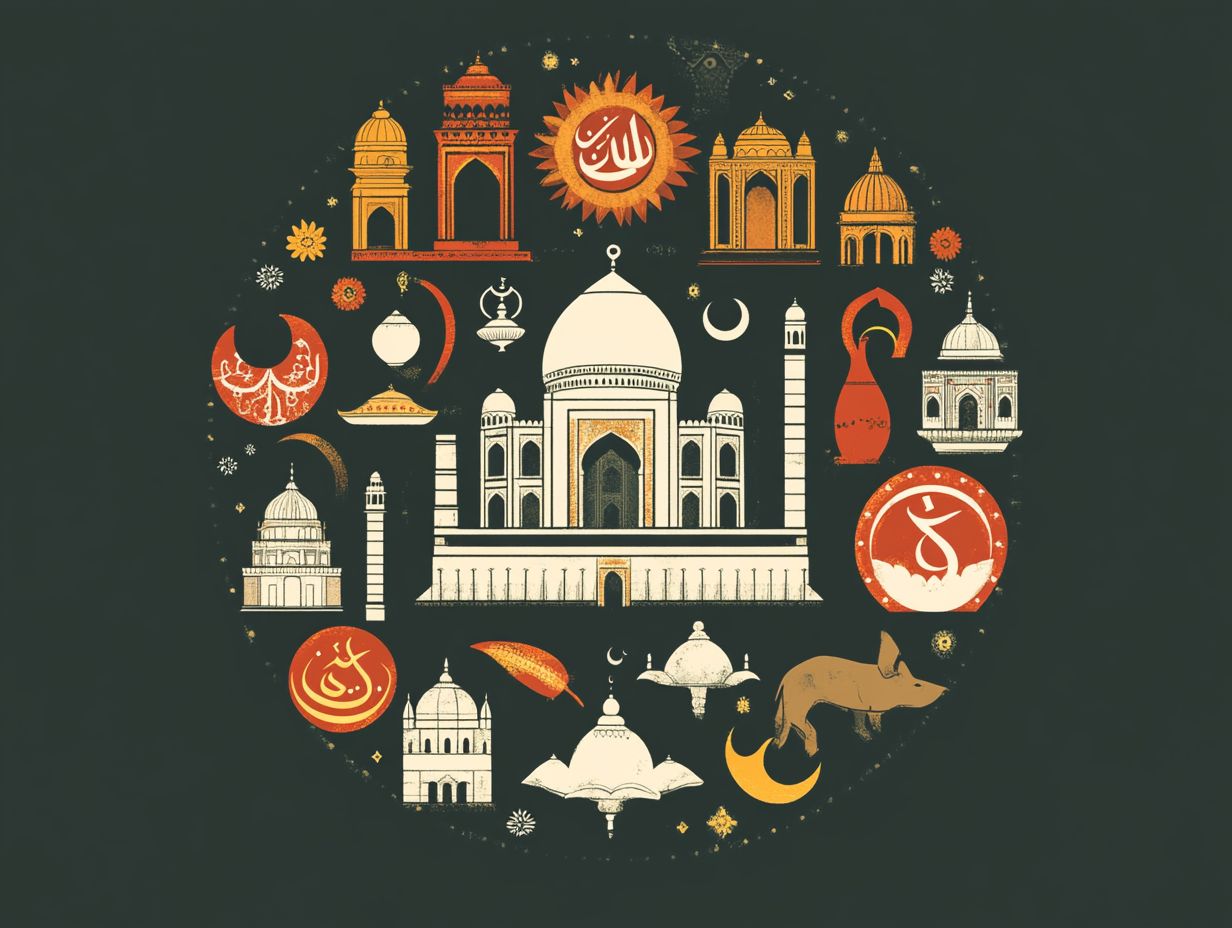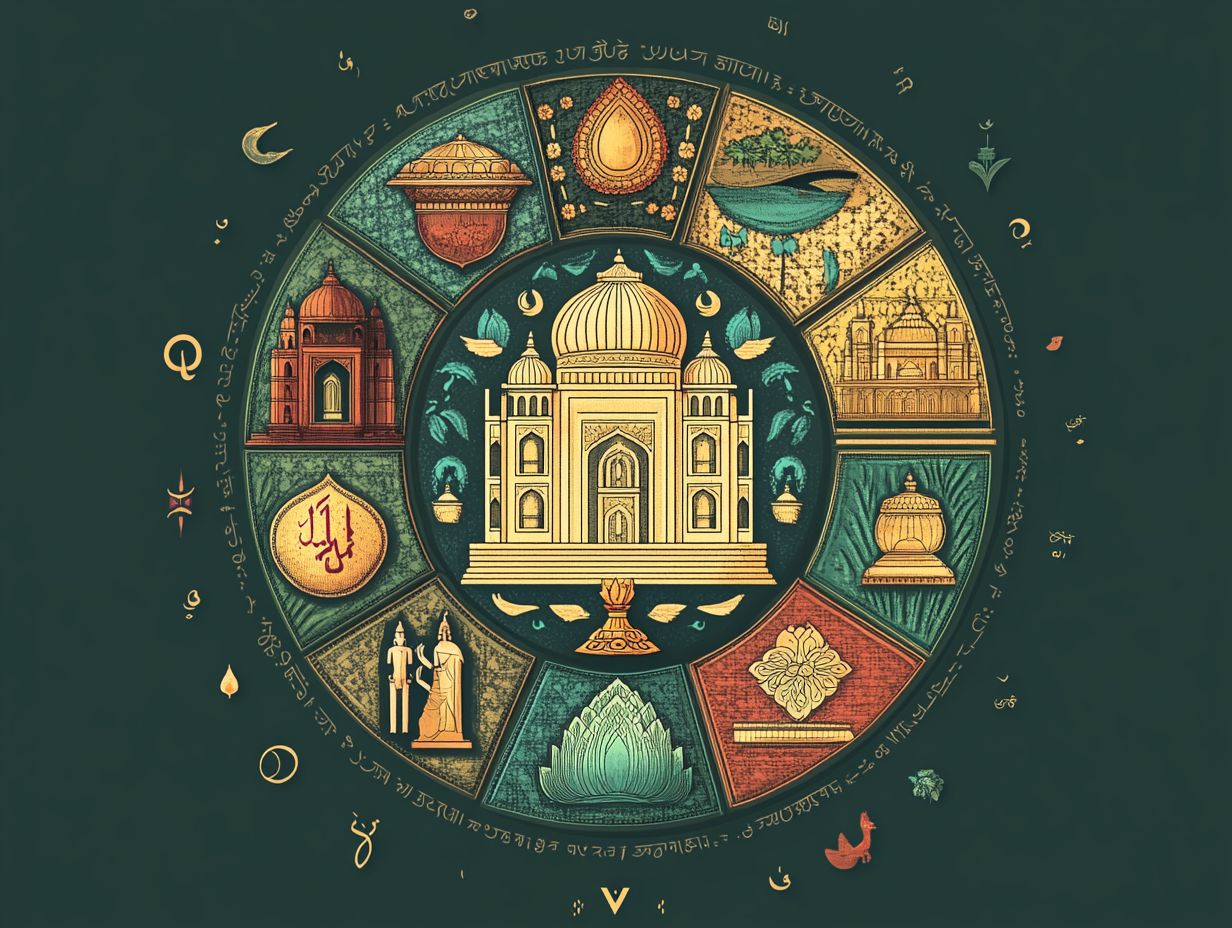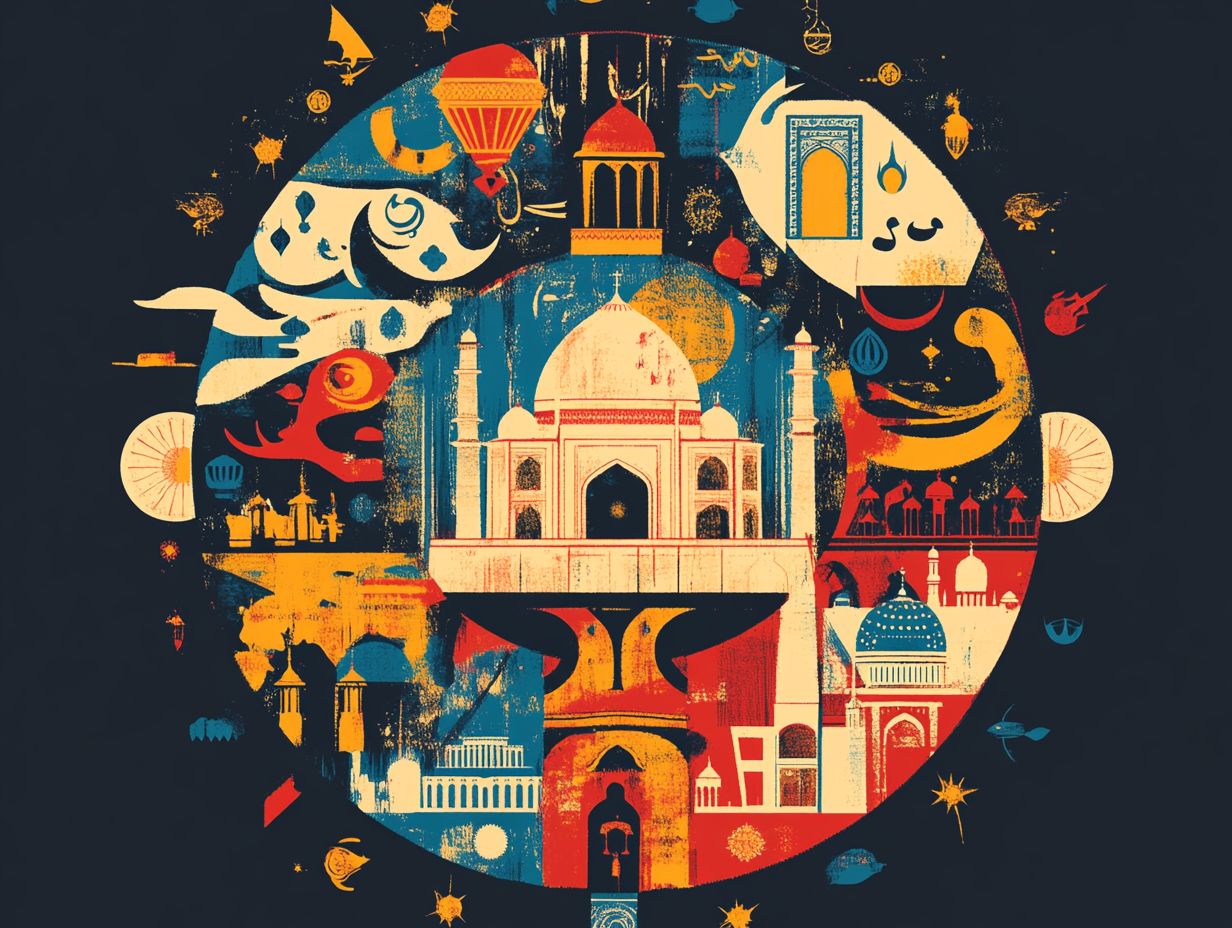How Do Islam, Sikhism, and Jainism Compare to Hinduism?
Hinduism, recognized as one of the world s most ancient religions, is a tapestry woven with rich traditions, profound beliefs, cultural influences, and diverse practices that profoundly influence the lives of its millions of adherents.
This exploration seeks to illuminate the essence of Hinduism, emphasizing its core beliefs, revered scriptures, and the pivotal concept of Dharma. It will also provide a comparative analysis of Hinduism alongside other major religions, such as Islam, Sikhism, and Jainism, showcasing both their shared elements and distinctive differences, including their founders like Guru Nanak, Mahavira, and Muhammad.
Moreover, this inquiry will reveal the fundamental practices of Hinduism, including the significance of yoga, meditation, and essential rituals, while discussing the ways in which this time-honored faith permeates the everyday lives of its followers.
Embark on this intellectual journey through one of the most intricate and captivating religions in existence.
What Is Hinduism?

Hinduism stands as one of the world’s oldest religions, distinguished by its rich tapestry of diverse beliefs and practices that span a myriad of spiritual and philosophical traditions.
Hinduism stands as one of the world’s oldest religions, distinguished by its rich tapestry of diverse beliefs and practices that span a myriad of spiritual and philosophical traditions.
At the heart of Hinduism lies the imperative of Dharma, which offers ethical guidance to its adherents, while the intertwined concepts of karma, reincarnation, and moksha profoundly influence their perceptions of life, death, and the cosmos.
This dynamic religion features the worship of multiple deities, epitomizing a complex polytheistic framework, yet it seamlessly incorporates elements of monotheism through the acknowledgment of a singular ultimate reality, known as Brahman. The inclusion of various sects within Hinduism further illustrates its diversity.
The Vedas and Upanishads, revered as authoritative scriptures and sacred texts, form the bedrock of Hindu thought, underpinning an intricate array of rituals and spiritual practices, such as meditation and communal gatherings, which nurture a profound sense of spirituality among its followers.
What Are the Beliefs of Hinduism?
The beliefs of Hinduism present a multifaceted and intricate tapestry woven with ethical principles, avenues for spiritual growth, and profound concepts of salvation, all centered on the pursuit of moksha liberation from the relentless cycle of samsara and achieving spiritual enlightenment.
At the heart of these beliefs lie the essential notions of karma and dharma, which serve as guiding lights for adherents in their actions and responsibilities. These principles cultivate a shared sense of community identity and establish moral codes that permeate daily life.
Additionally, Hindus acknowledge the paramount importance of divine grace in their quest for enlightenment, which materializes through various rites of passage and spiritual practices that create connections both to the divine and among individuals within their community, enhancing communal harmony.
What Is the Concept of Dharma in Hinduism?
The concept of Dharma in Hinduism serves as a profound ethical foundation that delineates the responsibilities and duties of individuals within their communities, guiding their moral choices and spiritual development. This multifaceted idea invites individuals to engage in deep reflection regarding their actions and the broader implications these choices carry for societal dynamics, promoting ethical living and social justice.
As Dharma manifests differently across various contexts, it compels each person to cultivate an awareness of the intricate relationship between personal desires and communal harmony. This delicate equilibrium promotes ethical living, where values such as integrity, honesty, and accountability not only enhance personal character but also lay a robust foundation for community relations, fostering a strong sense of community cohesion.
By emphasizing spiritual growth, the practice of Dharma encourages individuals to partake in self-reflection and mindfulness, nurturing a collective ethos that fosters compassion and empathy. Ultimately, this approach contributes to the cultivation of healthier, more harmonious communities.
What Are the Core Hindu Scriptures?
The core Hindu scriptures, chiefly the Vedas and Upanishads, constitute a vast repository of sacred texts that underpin Hindu beliefs, rituals, and philosophies. The Vedas, acknowledged as the oldest religious texts, are composed of hymns, rituals, and philosophical discourses, while the Upanishads engage with metaphysical concepts and spiritual teachings, addressing the essence of reality and the self. These scriptures not only guide religious practices and rituals but also offer profound insights into moral imperatives and spiritual enlightenment, influencing generations of devotees and contributing to their religious identity.
As vital elements of Hindu tradition, they act as a conduit between the material and spiritual realms, inviting individuals to explore their own consciousness. The interpretations of these texts have fostered diverse schools of thought within Hinduism, underscoring the significance of introspection and meditation. Their teachings have transcended cultural boundaries, leaving a mark on various Eastern and Western philosophical movements.
By championing universal truths and ethical principles, the Vedas and Upanishads play a pivotal role in an individual’s quest for knowledge and self-realization, thereby enriching the global spiritual landscape.
How Do Islam, Sikhism, and Jainism Compare to Hinduism?
The comparison of Hinduism with Islam, Sikhism, and Jainism unveils a rich tapestry of beliefs, practices, and rituals that illustrate both unity and diversity among these faiths, highlighting the significance of interfaith dialogue and religious tolerance.
Hinduism, with its polytheistic framework, boasts a multitude of deities, whereas Islam stands firmly in the realm of monotheism, underscoring the worship of a singular God, Allah, and the teachings encapsulated in the Quran. Both religions have influenced numerous social and cultural practices over centuries.
Sikhism, grounded in the wisdom of the Sikh Gurus, shares philosophical resonances with Hinduism, particularly in its emphasis on devotion and ethics. However, Sikhism’s strict monotheism contrasts with Hinduism’s polytheism.
In contrast, Jainism, with its profound commitment to Ahimsa (non-violence) and asceticism, presents a distinct viewpoint on spiritual practice and community service.
This cross-religious examination underscores the significance of interfaith dialogue and understanding in an increasingly multicultural world.
What Are the Similarities Between Hinduism and Islam?

Despite their fundamental differences, Hinduism and Islam reveal several striking similarities in beliefs and practices that nurture community and spirituality among their followers, including their emphasis on ethical living and morality.
Both religions demonstrate a profound reverence for the act of worship, as evidenced by the communal gatherings during festivals and prayer times, which serve to strengthen social bonds. Adherents of these faiths are encouraged to engage in practices that foster compassion and humanitarian efforts. Hindus often partake in community-oriented rituals and service activities, while Muslims embody the spirit of giving through initiatives such as food drives during Ramadan and other Islamic practices.
Ultimately, these shared practices reflect a common dedication to ethical living, enhancing individual spirituality while cultivating a robust sense of community and moral responsibility among practitioners.
What Are the Differences Between Hinduism and Sikhism?
While Hinduism and Sikhism share cultural roots and some philosophical foundations, they exhibit marked differences in beliefs, rituals, and community structures. Sikhism, established by Guru Nanak and the subsequent Sikh Gurus, is anchored in a strict monotheistic belief in one God, which stands in contrast to Hinduism’s diverse pantheon of deities. Additionally, Sikh practices emphasize community service and equality, rejecting the caste system prevalent in Hindu society.
The significance of the Guru Granth Sahib as the eternal Guru and the practice of community service through Sewa highlight Sikhism’s communal approach to spirituality, diverging from Hinduism’s more individualized rituals and practices. These distinctions shape the unique identities of each faith, fostering communities that, while distinct, remain interwoven, promoting religious diversity and understanding.
The core beliefs surrounding karma and reincarnation are manifested differently within each tradition. Hinduism teaches a cyclical view of life in which the soul is reborn into various forms based on past actions. In contrast, Sikhism emphasizes the merging of one’s soul with the divine through devotion and righteous living, seeking liberation from the cycle of rebirth altogether.
Rituals further distinguish the two; Hindu ceremonies often involve elaborate rituals and offerings to deities, whereas Sikh practices prioritize congregational worship, communal meals known as Langar, and simplicity in spirituality.
Ultimately, these distinctive elements contribute to a rich tapestry of faith and community engagement, illustrating how these two religions navigate their beliefs in the modern world.
How Does Jainism Differ from Hinduism?
Jainism offers a unique perspective on spirituality and ethics that distinctly differentiates it from Hinduism, particularly through its unwavering commitment to the principle of Ahimsa, or non-violence. While Hinduism embraces a vast array of rituals and deities, Jainism prioritizes asceticism and self-discipline as essential pathways to spiritual liberation, centering on the individual s quest for enlightenment and transcendence.
The absence of a central deity in Jain cosmology stands in stark contrast to the pantheistic elements prevalent in Hindu worship, highlighting the philosophical divergences between these two ancient traditions. Jain practices are deeply rooted in the teachings of Tirthankaras, who guide adherents on the path of righteousness.
Devotees of Jainism are called to adhere to stringent ethical codes that advocate compassion and respect for all living beings, further distinguishing their beliefs from the broader practices within Hinduism, which may include animal sacrifice in certain sects. The Jain commitment to truthfulness, Ahimsa, and non-attachment functions as a guiding principle for personal conduct, encouraging followers to minimize harm in their thoughts, words, and actions.
This moral framework significantly influences their rituals, which tend to focus more on self-reflection and community engagement rather than communal worship. Jain practices mark a substantial shift in the understanding of spiritual progress when compared to the often communal and ritualistic nature of Hinduism.
What Are the Main Practices in Hinduism?
The core practices of Hinduism encompass a rich tapestry of rituals, meditation techniques, and spiritual engagements designed to cultivate a profound connection with the divine and strengthen communal ties. These practices are informed by sacred texts such as the Vedas, which provide divine principles and moral guidance.
At the heart of Hindu worship lies the ritual of puja, which involves offerings and prayers to various deities, complemented by significant observances such as festivals that not only forge strong community bonds but also elevate collective spirituality. Hinduism’s polytheistic nature allows for a diverse range of practices and rituals.
Meditation serves as another essential practice, fostering inner peace and self-realization. Additionally, ethical living and community service are underscored as vital pathways toward spiritual growth and a deeper understanding of one s dharma.
What Is the Purpose of Yoga in Hinduism?
In Hinduism, yoga emerges as a multifaceted practice crafted to enhance spiritual growth, promote meditation, and facilitate the journey toward enlightenment. As a holistic discipline, yoga weaves together physical poses (asanas), breath control (pranayama), and meditation techniques, all aimed at harmonizing the body, mind, and spirit. This integration not only cultivates inner peace but also aligns practitioners with their higher selves, fostering a deeper understanding of their place within the universe and the pursuit of moksha, or liberation from the cycle of reincarnation.
In exploring the diverse forms of yoga, one encounters paths such as Hatha, Bhakti, Karma, and Jnana, each addressing unique aspects of spiritual and personal development. Hatha yoga emphasizes physical prowess and flexibility, while Bhakti yoga centers on devotion and love for a higher power. In contrast, Karma yoga focuses on selfless actions and service to others, enabling practitioners to transcend their ego. Jnana yoga promotes profound introspection and wisdom through knowledge.
Together, these practices offer a multitude of benefits, including improved mental clarity, emotional stability, and an enhanced sense of connection to the divine, ultimately guiding yoga enthusiasts toward a more fulfilled existence.
What Are the Key Rituals in Hinduism?

Key rituals in Hinduism encompass a diverse array of practices, including puja, festivals, and rites of passage, all of which celebrate significant spiritual milestones and foster a sense of community bonding.
These rituals transcend mere ceremony; they hold profound significance, serving as vital conduits for spiritual connection and holistic development. Through puja, worshippers not only express reverence for the divine but also cultivate inner peace and mindfulness, thereby reinforcing their personal relationship with spirituality.
Festivals such as Diwali and Holi extend beyond individual celebrations, acting as powerful catalysts for community engagement, where individuals unite in vibrant expressions of faith and cultural heritage. The samskaras, or rites of passage, further enrich this intricate tapestry of tradition, marking pivotal life moments such as birth, marriage, and death. These rites provide a framework for understanding life s journey while simultaneously strengthening familial and social bonds.
Collectively, these practices weave a fabric of shared values that encourage inclusivity and continuity within the rich and diverse tapestry of Hindu life. These shared values encompass a range of theological concepts and moral guidelines derived from sacred texts and traditions.
How Does Hinduism Influence the Daily Lives of Its Followers?
Hinduism exerts a profound influence on the daily lives of its adherents, woven intricately through a vibrant tapestry of rituals, ethical principles, and community involvement that shape their actions and interactions. Its influence extends to social and cultural norms, embedding ethical values and community practices deeply within everyday life.
Followers frequently commence their day with prayer and meditation, seeking spiritual clarity and grounding before immersing themselves in their daily responsibilities. The ethical tenets derived from Dharma guide personal conduct and social relationships, while communal gatherings and festivals reinforce connections among practitioners, cultivating a sense of belonging and shared identity.
This dynamic interplay between spirituality and everyday life allows individuals to nurture personal growth and uphold moral integrity.
What Is the Importance of Caste System in Hinduism?
The caste system in Hinduism represents a complex social structure that has profoundly shaped community identity and individual roles throughout history, influencing interactions and ethical beliefs. Traditionally, this system categorized society into distinct groups based on profession and social status, significantly impacting one’s dharma and the ethical responsibilities inherent to each caste. This system is intricately linked with the religious and social practices embedded within Hindu culture.
While modern perspectives increasingly scrutinize and challenge the caste system, its historical significance continues to be a relevant topic of discourse, reflecting the intricate relationship between religious beliefs and social practices in shaping community dynamics.
The implications of this social hierarchy extend far beyond mere categorization; they deeply influence economic opportunities and personal relationships across generations. In numerous communities, individuals remain tethered to caste-related expectations that dictate career paths, marriage prospects, and social interactions, raising ethical dilemmas surrounding equality and individual freedom. The caste system’s impact on social justice and community cohesion remains a critical area of discourse.
As discussions regarding social justice and caste discrimination gain traction in contemporary society, it becomes imperative to critically assess how these historical constructs continue to impact modern life, advocating for reform and fostering a deeper awareness of the ethical considerations associated with caste affiliations. This discourse often intersects with broader discussions on religious tolerance and societal ethics within Hindu communities.
How Does Hinduism Impact Social and Cultural Norms?
Hinduism profoundly influences social and cultural norms, shaping the ethical values and community practices that govern daily life and interpersonal interactions. The teachings found within Hindu scriptures and traditions, such as the Vedas, advocate ideals such as compassion, respect for all living beings, and the relentless pursuit of truth, resonating deeply within societal frameworks.
Festivals, rituals, and communal gatherings serve as vital expressions of cultural integration, reflecting the values of unity and diversity that are hallmarks of Hindu communities. This influence permeates various facets of life, including family structures, dietary laws, and social justice initiatives, reinforcing the imperative of ethical living. These communal practices also highlight the importance of religious identity and cultural heritage in maintaining community cohesion.
Consequently, individuals within these communities often discover that their personal beliefs align seamlessly with broader societal expectations, fostering a harmonious environment where traditional values are preserved while adapting to contemporary challenges. The concepts of karma and dharma further delineate moral responsibilities, guiding individuals actions toward the greater good and cultivating a sense of accountability in community relationships. These traditional values are often derived from and reinforced by religious texts and communal rituals.
By prioritizing education, environmental stewardship, and charitable endeavors, the teachings of Hinduism encourage active engagement in societal welfare, thereby strengthening communal bonds and promoting a sense of belonging that transcends mere coexistence.
Frequently Asked Questions
1. How do Islam, Sikhism, and Jainism compare to Hinduism?

Islam, Sikhism, and Jainism are all religions that emerged in South Asia and have some similarities to Hinduism. They all have a belief in one God, reincarnation, and the concept of karma. However, they also have distinct differences in their beliefs and practices. For instance, Jainism places a significant emphasis on non-violence (Ahimsa) and has no single founder, while Sikhism was founded by Guru Nanak and emphasizes community service and equality.
2. Are there any major differences between Hinduism and Islam?
Yes, there are some major differences between Hinduism and Islam. The most significant difference is the belief in one God in Islam, while Hinduism has multiple deities. Additionally, Islam has a strict monotheistic belief, while Hinduism allows for a more diverse range of beliefs and practices. Furthermore, the Quran is the central religious text in Islam, whereas Hinduism has several sacred texts, including the Vedas and Upanishads.
3. How is the concept of karma viewed in Sikhism compared to Hinduism?
In both Hinduism and Sikhism, the concept of karma is present. However, in Sikhism, karma is seen as a way to achieve liberation from the cycle of rebirth, while in Hinduism, it is linked to the caste system and social status. Additionally, ethical living and community service are emphasized in both religions, but Sikhism places a stronger focus on equality and social justice.
4. How does Jainism differ from Hinduism in terms of beliefs?
One major difference between Jainism and Hinduism is the belief in ahimsa or non-violence in Jainism. This belief is taken to an extreme level in Jainism, where even harming insects or plants is avoided, while in Hinduism, it is not as strictly followed. Additionally, Jainism does not have a single founder but reveres 24 Tirthankaras, whereas Hinduism has a more diverse range of deities and scriptures.
5. Is the practice of meditation similar in Hinduism and Islam?
Yes, both Hinduism and Islam have a practice of meditation and prayer. However, the objectives of meditation may differ between the two religions. In Hinduism, meditation is seen as a way to connect with the divine and attain enlightenment (moksha), while in Islam, it is a means to focus and strengthen one’s relationship with Allah through personal devotion and religious observance.
6. How do the religious texts of Sikhism, Hinduism, and Jainism compare?
Sikhism’s main religious text is the Guru Granth Sahib, while Hinduism has a vast collection of sacred texts such as the Vedas, Upanishads, and Bhagavad Gita. Jainism, on the other hand, follows texts like the Agamas and teachings of the Tirthankaras, particularly Mahavira. The Guru Granth Sahib is seen as a compilation of the teachings of the Sikh Gurus, while Hindu texts are believed to have divine origins and contain various philosophical and spiritual teachings. Jainism emphasizes ahimsa (non-violence) and the path to spiritual purity and enlightenment.
